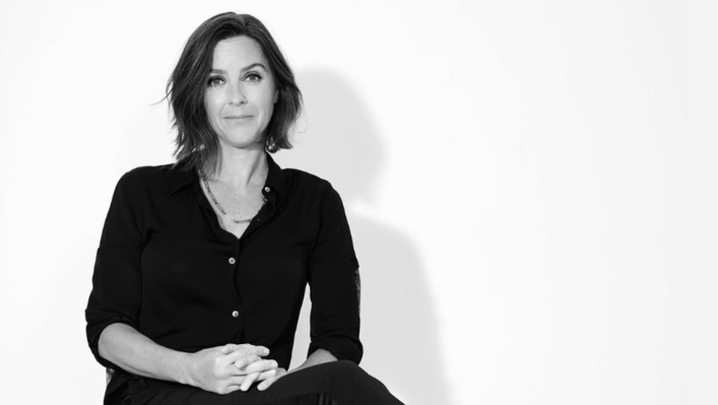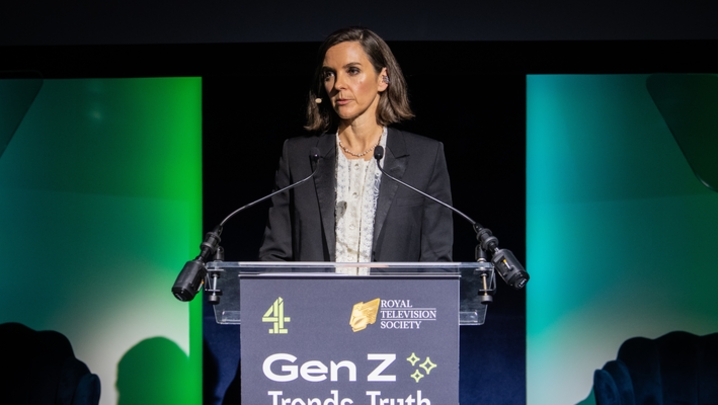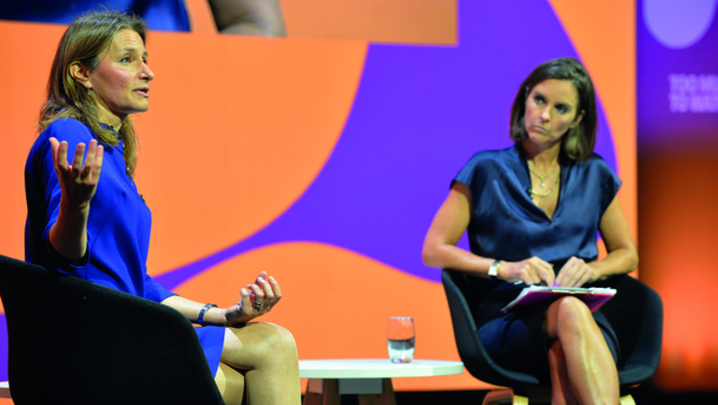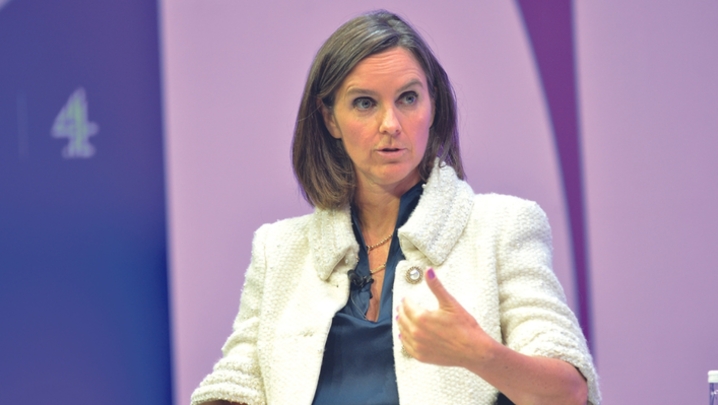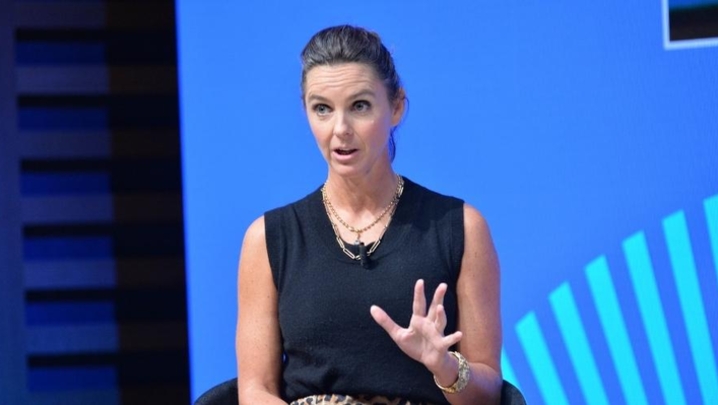The Channel 4 CEO discusses indies, digital growth, advertising and hit shows
Now that the threat of privatisation is no longer looming, Alex Mahon can focus on other items in the Channel 4 in-tray: recovering from the economic downturn; accelerating its digital strategy; and coming up with new hits.
In a wide-ranging interview that covered everything from company culture to the channel’s relationship with government and industry partners, Mahon first addressed the struggles of the UK’s indie sector.
“Last year was horrendous for independent producers and this year hasn’t been much better,” she said. This was due not only to the US strikes in the screen industry but also to the downturn in the advertising market and the pressure on the BBC to reduce costs.
“But there are green shoots. The ad market is recovering and we’ve started to buy bigger again,” she said. “I don’t think we’ll get back to the boom times because streamers also have become more disciplined as their business model has settled down.”
Producers of mid-budget titles will be hardest hit, she warned, because viewing preferences have changed. “There’s a desire for live, daytime shows that… feel familiar. Then they want high-end, streamable bingeing. But consumers aren’t coming as much to the middle, where lots of producers have diligently built their business over time. That means that some businesses are finding it hard to survive. Our job is to try to be clear about what we want to buy and make sure that we brief that out.”
The relationship with indies has been further tested by this year’s Media Act, which will allow Channel 4 to make and own some of its content. When pressed about its plans by her interviewer, the journalist Amol Rajan, Mahon tried to reassure producers: “I don’t want to [do] it in a way that damages the indie sector, especially with what they’ve been through.
“It’s going to take about a year until the Government actually enacts it. It will then grow slowly after that. There are multiple ways that we could do it, not just by starting an indie. And we won’t be buying massive indies, so [the Act] won’t make a dramatic difference for some time.”
A broader and more immediate focus is Channel 4’s Fast Forward strategy, which has three central strands: accelerating digital growth; diversifying the way it makes money to become less reliant on advertising; and reducing costs, including moving out of linear.
Focusing on the move from linear to digital, Mahon said that, this year, 30% of income will come from digital advertising. “Last year, it would have been 27%, and the average across commercial broadcasters abroad is about 11%, so it’s way ahead of [the] market.”
To diversify its revenue streams, the channel is working on free ad-supported streaming channels and e-commerce, and has already launched Channel 4+, an ad-free subscription service.
"There are green shoots. The ad market is recovering and we've started to buy bigger again"
But the plan isn’t to lean into a subscription model. “When viewers are really into Married at First Sight, they want to pay to watch as much of it as possible without advertising. Fair enough. But that’s not our core business model. It’s not even 5% of our business,” Mahon said.
Rajan asked whether a digital eyeball is worth as much as a linear eyeball. A similar question at the last RTS London Convention in 2022 elicited the answer that they were “the same”. Now, two years later, Mahon’s answer was that “it was worth more”, a sentiment echoed by ITV CEO Carolyn McCall during her session later in the day.
This change had come about “because advertisers want to put money into digital, but they want their advertising alongside content that is high quality, that consumers are very engaged in. And they want a way they can measure it.” Mahon said that while digital content made up 18% of Channel 4’s viewing, it represented 30% of its advertising revenue.
Talk turned to the abandoned plans to privatise Channel 4. Rajan asked whether, given the fast turnaround in culture secretaries in recent years, Mahon’s strategy was to delay the decision until there was a change at the top. “I wish it had felt like that,” she said. “I did go in for a meeting and realised it was my 10th Secretary of State. There has been a lot of change.
“The strategy wasn’t delay, delay, delay. It was focused on data, facts, evidence. In the end, there wasn’t the data or the facts [for privatisation].”
Looking to the future of Channel 4, Mahon said the move from London to Leeds had brought a new energy to the broadcaster. Ninety per cent of the people whose jobs were moving to Leeds declined relocation. Now, she said: “Forty-two per cent of our staff have been in Channel 4 less than three years. That’s a massive amount of churn and change but, with that, you also get a new channel. You get people who’ve got new enthusiasm, new knowledge, new learnings from elsewhere.”
Rajan used the RTS stage to give Mahon the right of reply to Richard Osman’s comments in an episode of the podcast The Rest Is Entertainment, “How do you save Channel 4?”. But Rajan didn’t realise until too late that Osman and co-host, Marina Hyde, were in the audience. “This is going to be really awkward, because I’m now going to read out the rude things that he said… but fuck it,” said Rajan.
Osman had questioned the health of Channel 4’s relationship with independent producers. Mahon told Rajan: “It was really rocky. We cut money last year and it hit indies hard, and it hit them first, because we’re the biggest commissioner of indies. The phrase is: ‘When Channel 4 catches a cold, everyone else does’,” she said.
Osman’s other point concerned Channel 4’s “trouble creating hits”, said Rajan. “Married at First Sight is massive. We’ve just reformed Hollyoaks and it had its biggest-ever streaming episode last week. The Piano is a huge homegrown hit that came out in the last couple of years. Merseyside Detectives was a massive hit this summer.
“So there are hits. Maybe he’s not watching them all,” Mahon said with a smile, “but I’m happy to send him some links!”
Session Five: ‘UK Keynote: Alex Mahon’. The CEO of Channel 4 was in conversation with Amol Rajan, journalist and presenter. The producer was Sue Robertson. Report by Shilpa Ganatra.


